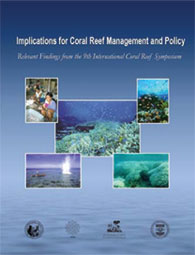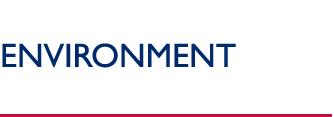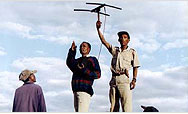Technical Publications
These publications are a sampling of the technical reports and publications generated by USAID’s water sector in support of its goals of education and information transfer on freshwater, coastal and fisheries resources issues. These publications cover a wide range of technical topics, from water utilities to coral reef management.
Accessing publications addressing IWRM framework, as well as USAID’s work in specific technical fields, is important to understanding how work in the water sector is approached. A selection of publications are presented here as an introduction to a larger body of water-related activities. A more extensive list of publications related to USAID’s work in this sector can be found by going to http://www.nric.net/pub_doc/doc_pubsearch.cfm.
Integrated Water Resources Management: Ushering in a blue revolution
This brochure defines Integrated Water Resources Management and describes USAID activities to implement the approach through partnerships with Missions and host countries across the globe.
Page 1 (PDF 6.148MB), Page 2 (PDF 3.838MB)
Integrated Water Resources Management: A framework for action in freshwater and coastal systems
This booklet provides a brief overview of the growing worldwide water crisis, presents recent international statements on water resources management, and describes USAID efforts to address the need for sustainable use and resource protection through an integrated approach to water resources management. (PDF 777KB)
This factsheet describes the Water for the Poor Initiative that grew out of a global movement toward partnerships set out at the World Summit for Sustainable Development at Johannesburg in 2002. This five-year project in three West African nations will address human health needs, poverty alleviation, and sustainable development through improved management of water resources.
(PDF 156KB)
Managing Freshwater Inflows to Estuaries: A Methods Guide
This Guide describes a step-by-step process that links the catchment to its estuary and proceeds from issue definition and planning, to winning formal commitment to IWRM policies and procedures and on to implementation. Each step describes the priority actions that integrate the best available science with a participatory and transparent management process. (PDF 3.538MB)
Proceedings Report on Lessons Learned in Recovery: Post-Tsunami Relief and Reconstruction for Sustainable Coastal Development (2006)
The first of two learning workshops on the post-tsunami transition from relief to rehabilitation and reconstruction was convened at the Asian Institute of Technology on February 15-17, 2006. Participants to the workshop were middle to high-level government professionals and post-tsunami program managers. The goal was to share experience between different tsunami impacted regions on responses and interventions to capture what worked, what did not, and why. (PDF 244KB)
Bankable Water and Sewerage Utilities, Volumes I and II (2005)
Often, municipal water and sewerage utilities in developing and transition countries face an enormous challenge in obtaining financing for their rehabilitation projects and investments in water and waste water capacity. Many utilities, however, do not meet the requisite conditions demanded by capital markets, i.e., they are not “bankable.” This two-volume report focuses specifically on the relationship between innovative financing models and improved water and wastewater service provision, using a case study approach.
Implications for Coral Reef Management and Policy: Relevant findings from the 9th International Coral Reef Symposium (2002)
 |
| Front cover of coral reef report. |
The report can be downloaded as a single file or by section (PDFs). See list below description.
Coral reefs constitute one of the earth’s most complex, beautiful, and biologically diverse ecosystems. Many coral reefs around the world are now seriously threatened by overexploitation, destructive fishing practices, coastal development, pollution, and global climate change. In response to these threats, more than 1,500 scientists, managers, resource users, government officials, journalists and others interested in coral reef studies and management gathered in Bali, Indonesia in October 2000 for the 9th International Coral Reef Symposium. This report synthesizes some of the best scientific and management information presented at the symposium and is intended for use by those in positions to conserve, protect, and rehabilitate coral reefs — policy makers, managers, and the public-at-large.
Entire Report (PDF 14.578MB)
By Section
- Front Cover (PDF 1.728MB)
- Front Matter (PDF 677KB)
- Introduction (PDF 1.488MB)
- Global Status of Coral Reefs (PDF 1.73MB)
- State of Research Knowledge (PDF 2.562MB)
- Resource Management (PDF 2.275MB)
- Socio-Economics and Capacity Building (PDF 1.36MB)
- Trade and Management (PDF 2.469MB)
- Assessment and Monitoring (PDF 1.138MB)
- Global Climage Change and Coral Reefs, Web Links (PDF 1.606MB)
Towards a Water Secure Future: USAID’s obligations in integrated water resources management for Fiscal Year 2000 (2001)
To improve the impact of USAID’s water portfolio, this analysis examined how and where USAID invests in water-related activities and assessed the potential for improved effectiveness and efficiency across the portfolio. Results are provided in two ways. In Part I, obligations are reported as they occur within activity categories. In Part II, USAID water-related activities are described in terms of the results and solutions they provide to world water security issues faced by the global community in the areas of water scarcity, water quality, resource allocation, and disaster preparedness. Examples of USAID programs and activities targeted toward the sustainable use and management of water resources are provided. (PDF 1.431MB)
Towards a Water Secure Future: The Role of USAID in Water Resources Management (2001)
USAID’s activities in the areas of water and human health, irrigated agriculture, coastal zone management, integrated water resources management, disaster preparedness, and drought and flood forecasting worldwide are described in this article, published in the Water Resources IMPACT’s international water-activities edition. IMPACT is a journal published by the American Water Resources Association. Permission for posting this article was granted by the publisher. (PDF 139KB)
Droughts? Floods? Famines? Water is the Key (2000)
Water scarcity in 2000 affects 450 million people in 31 countries; by 2025, it is estimated that 2.8 billion people in 48 countries will be affected. Water stress occurs not only in arid and semi-arid regions, but also in many densely populated parts of the humid tropics where water was once considered to be plentiful. Intensive irrigation, aquifer depletion and global climate change are major factors exacerbating this growing crisis. Article published in an edition addressing famine prevention of USAID’s Frontlines publication.
(PDF 358KB)
International Trade in Coral and Coral Reef Species: The Role of the United States (2000)
Coral reef species are harvested globally for commercial purposes, contributing to the decline and degradation of reefs, primarily through the use of destructive collection practices and resource overexploitation. This report examines the nature and extent of trade-related threats to reefs, assesses the role of the United States in the trade, describes current U.S. activities, and recommends strategies and actions to address these threats. (PDF 7.197MB)
Water-Energy Nexus
This fact sheet explores combined water-energy interventions that can successfully be integrated into management practices to break the common cycle of unsustainable use and environmental degradation. (PDF 140KB)
Building Institutional Capacity for Environmentally Sustainable Mariculture
This fact sheet presents a number of capacity-building and governance interventions targeted to promoting environmentally sustainable and balanced growth in aquaculture production. Project work has taken place in Honduras, Indonesia, and Tanzania. (PDF 437KB)
Back to Top ^


